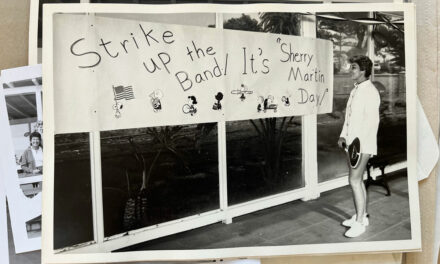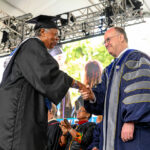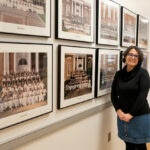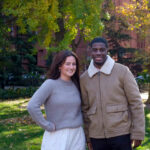
Why Am I Here?
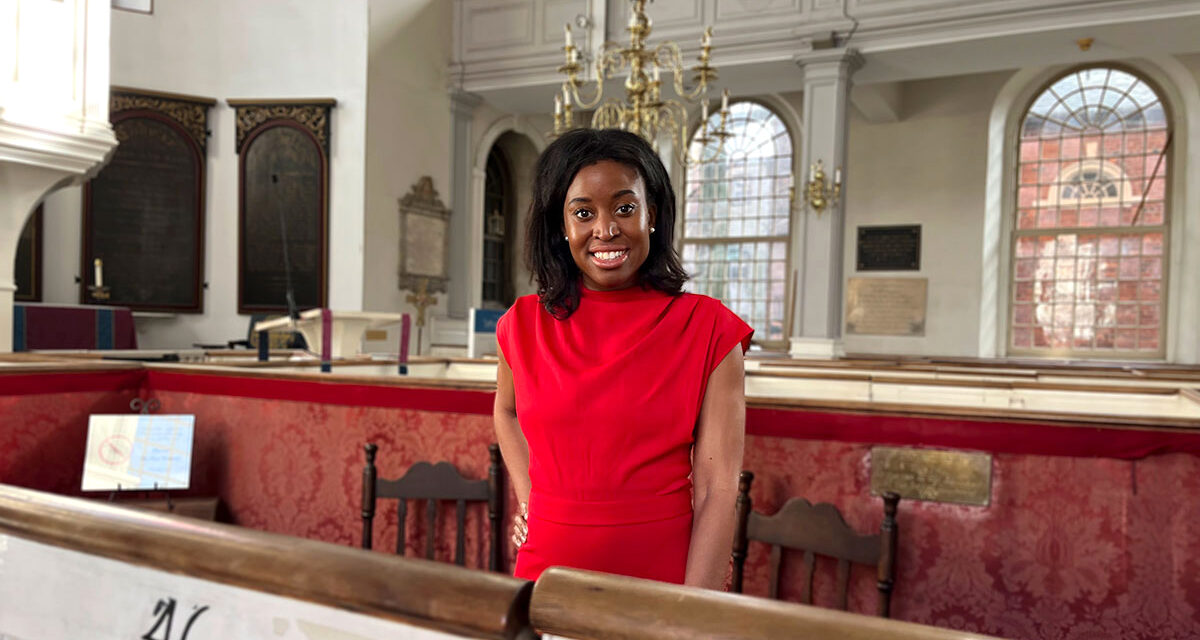
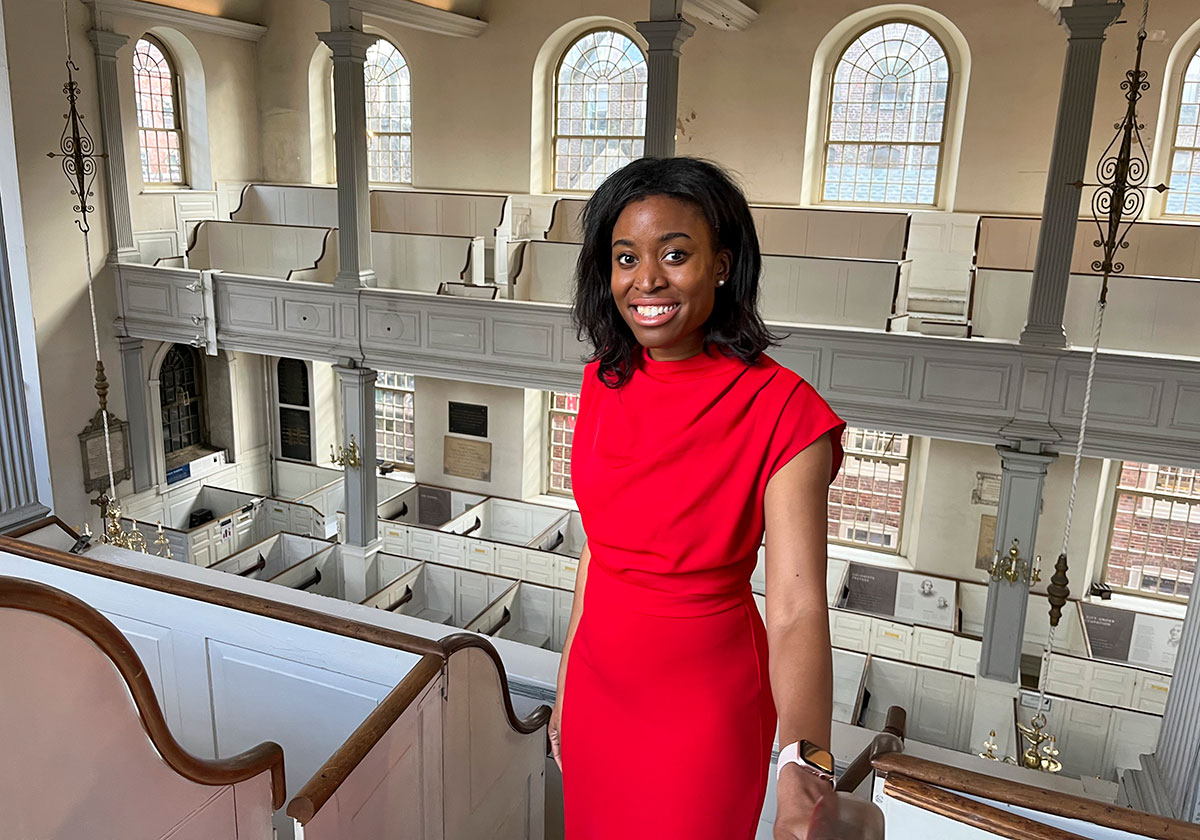
But Why Am I Here?
Jaimie Crumley ’08 is “Illuminating the Unseen”
BY JESSICA YARMOSKY
It was September 1832. In Franklin Hall in Boston’s South End, a woman stood and began to speak. Her name was Maria Stewart, and she was Black, born free in Hartford some 30 years before. She was a recent widow who’d supported herself by being a domestic servant, while devouring any literature and religious texts she could get her hands on. She was an active member of Boston’s African Baptist Church, an outspoken feminist bent on encouraging Black people, especially women, to pursue education and demand political rights. A year prior, in 1831, she’d published an essay calling for her Black audience to “sue for your rights and privileges…Know the reason you cannot attain them.”
That day in September, she delivered a speech called “Why Sit Ye Here and Die?” In it, she railed against oppression, noting that while Black people in the North didn’t have to experience the “horrors of slavery,” the racism they faced in the North was “little better than that.” She called for equal rights for Black women and the abolition of slavery.
While it’s perhaps unsurprising that Stewart’s speeches weren’t wholly well-received at the time, that didn’t stop her from continuing to speak for a radical upending of current societal values. She’d go on to have a short but impactful public speaking career before turning to teaching and continued activism. That day in September marked the first known instance of a woman—of any race—giving a public speech. She’d also be one of the first to address an audience of both men and women, white and Black–called a “promiscuous” audience at the time.
By the time she died in 1879, Stewart had cemented herself as a leading voice in the anti-slavery and women’s liberation movements.
That day in 1832, Stewart couldn’t have known just how monumental her speech—and her legacy—would become. And she certainly couldn’t have known that almost 200 years later, her words would begin to answer some of the multitude of questions an aspiring academic, Jaimie Crumley, had about religion, race, gender, culture–and her place amongst all of it.
Jaimie spends most of her time these days in her office next door to the Old North Church, just a few miles from where Stewart delivered that speech in 1832. Get to know Jaimie—a Black feminist intellectual historian whose path took her from St. Stephen’s and St. Agnes to Massachusetts, to divinity school and a Ph.D. program, and then to a university professorship— and you’ll quickly understand why her current gig at the Old North Church is the perfect fit. She’s spent the last year as a research fellow with Old North Illuminated, a secular, private non-profit that works to preserve and interpret the history of the Old North Church, which was founded in 1723. Jaimie’s current research focus? Black and indigenous congregants and their experience at the church from the time of its founding through the nineteenth century.
These stories play a crucial role in understanding the complex history of the Church. But in the public eye, they often take a back seat to the Old North Church’s most famous association. In 1775, a silversmith named Paul Revere asked some of his friends who attended Old North to hold lanterns in the church’s steeple, signaling whether British troops were approaching by land or by sea. And while Paul Revere’s ride is a beloved story, it’s part of Jaimie’s job to educate the public about the multitude of other stories, lives, and experiences wound tightly into the church’s 300-year history. And that means digging into centuries’ worth of well-preserved historical archives. “We want people to see us,” Jaimie says, “as more than just that one night.”
“I have a dream that my four little children will one day live in a nation where they will not be judged by the color of their skin but by the content of their character.”
Dr. Martin Luther King, Jr.
The content of my character
Jaimie’s path as an academic has been deeply influenced by her own experience with religion. Born in Germany to parents in the U.S. military, Jaimie moved to Virginia going into the fifth grade. Until that point, she and her family had attended Baptist churches, and St. Stephen’s and St. Agnes was her first exposure to the Episcopalian faith. But Jaimie was drawn to it from an academic and historical perspective. “I was really interested in religion and religious history,” she says. “I would read historical fiction on the weekends.” In seventh grade, she was introduced to European history, and delved deeper into poetry and religion classes. Being able to marry history and religion was exciting. “I don’t think that all of our peers who went to other schools got to have that combination,” she says. She fondly remembers Dr. Roberta Klein’s freshman English class and says she was also influenced by her AP U.S. History class.
While she was growing as a SSSAS student, so was her fascination with how various faiths wove their way into everyday human experiences across centuries. But she says she didn’t really think about becoming an academic—she didn’t have that profession on her radar yet. “But I did know I had a really great interest in religion,” she says. “And what I liked about SSSAS was that it was a safe space to be able to have conversations about it. That was something I was really excited about.”
During a summer spent interning with Christ Church in Alexandria, Jaimie deepened her knowledge of the Episcopalian faith. “I ended up learning a lot more about what the church is today and what kind of work the Episcopalian church is passionate about,” she explains.
It was a preacher outside of the Episcopalian faith, though, whom she immortalized in her yearbook quote when she graduated in 2008: “Thank you for judging me and befriending me based on the ‘content of my character,’” the quote began. Jaimie said those words, originally spoken by Martin Luther King, Jr., meant a lot to her at the time. But she now sees her choice to quote King—a broadly-known, popular historical figure—as telling about the somewhat limited scope of Black history, other than big names like King and Harriet Tubman, that she had been exposed to.
Now, she’s out to change that. “There were so few Black people who most of us know from history,” she says. “And one thing that’s been exciting to me about my work is that now I know how to find all these stories of Black women and their words. And I think that’s really powerful.”
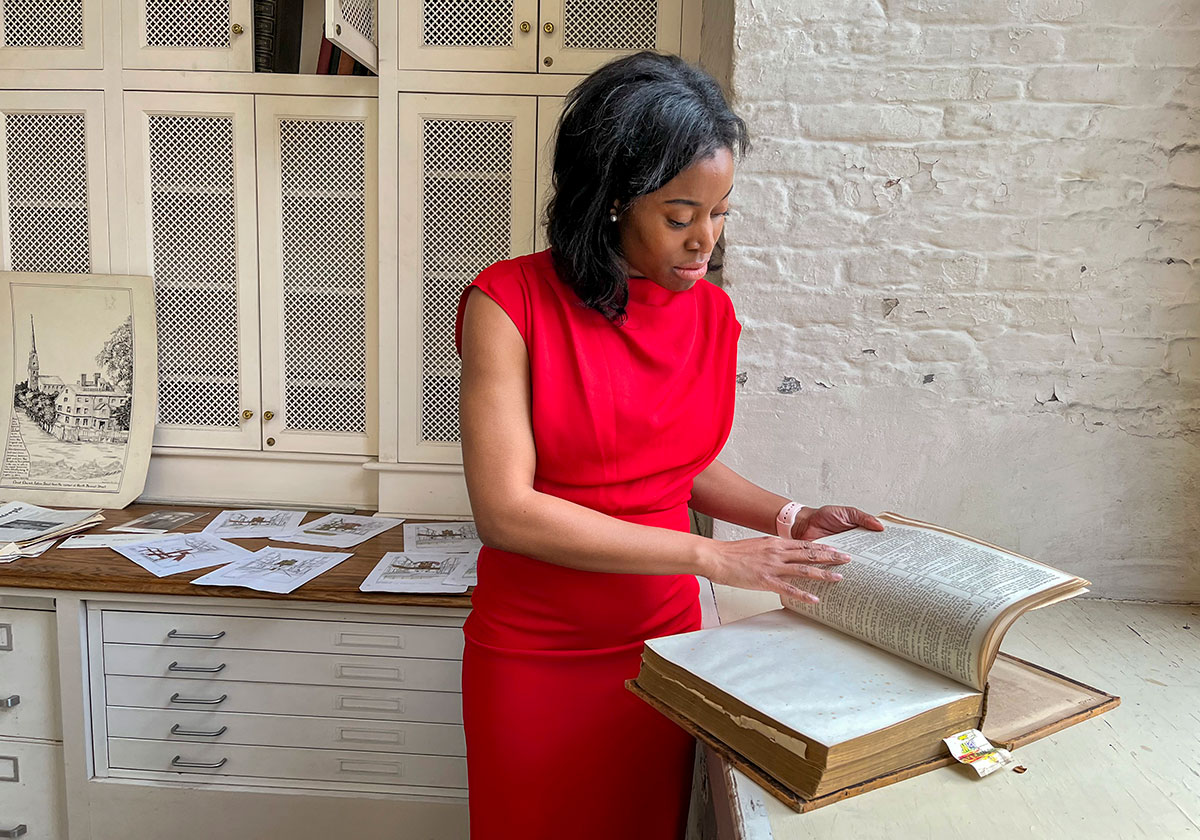
Shaping a future
Jaimie’s parents had both obtained college degrees later in life, when Jaimie was in middle school. So when Jaimie began classes at Wellesley College in fall 2008, she may have been a “traditional” freshman, but she still wasn’t sure exactly what she was passionate about. “I actually was really interested in law,” she says. And of course, her interest in religion hadn’t waned. But she was concerned about the thing a lot of college students choosing a major are concerned about: money. “I was concerned with how people pay bills,” she laughs. “And it’s really funny because now, being a college professor, my students are concerned about the same thing. There’s an anxiety of being eighteen like, how am I going to shape a future off of an interest in religion?”
Jaimie ended up declaring a major in international relations, with a focus on history and religion—a perfect reflection of her high school academic interests. And she knew she wanted to continue studying religion after college. “I remember I called my mother one day to tell her, Hey, I’m not gonna go to law school after I finish college. I’m actually going to apply to divinity school.”
Divinity school, Jaimie reasoned, would allow her to deepen her study of religion in a practical way. Jaimie’s mom was confused, though. “She said, ‘you better figure out how to get a Ph.D. in that,’” Jaimie laughs, “’because I don’t know what that’s about.”
“I had a really great interest in religion, and what I liked about SSSAS was that it was a safe space to be able to have conversations about it.”
Questions and answers
What does one do with a master’s of divinity studies? That was the big question that hovered over Jaimie and her classmates at Yale Divinity School. She began in 2012, when the tides of the school were shifting. Jaimie’s class had more Black students than any previous one in the school’s two-century history. Jaimie wasn’t the only one questioning what she’d do with her future degree in divinity. “All of the Black women were like, what are we doing here?” she remembers. “Which was really funny.”
The traditional route after a master’s in divinity is to become a pastor in a church. “But a lot of us knew we didn’t necessarily want to do that,” Jaimie says. “So I think those years were a little bit challenging.” Challenging, because Jaimie still wasn’t sure exactly how to apply her love for history and religion to a profession. During divinity school, she became ordained in the American Baptist Churches, USA, and served as an associate minister at the Alfred Street Baptist Church in Alexandria, and then as the director of Christian Education at the First Baptist Church of West Hartford, Conn.
But, Jaimie says, she still had questions about society, gender, race, and her place in the world, and she didn’t find answers to them as a minister.
Instead, Jaimie found them in the classroom in the texts and stories of early American Black women, beginning with her first-year American religious history course at Yale Divinity School. These classes were able to go much deeper than previous classes she’d had, even in college. “For the first time,” Jaimie says, “I was being invited to look at archival sources and to develop my own questions about the history of the religion in the United States.”
With that power, Jaimie began uncovering speeches and writings by Black women from as early as the 1800s. These women’s Christian faith inspired them to speak out against slavery, racism, and sexism. “Black women were speaking in their own voices about certain political issues they were passionate about,” she says. “But they were doing it using Christian language. And I thought that was really interesting.”
Interesting, especially, because Jaimie felt like these women in the past were asking the same questions that she was, in the present. “They were going into churches and community groups and political groups, and they were basically saying, I know I’m supposed to be here, but why am I here?…And I felt like I was doing that now.”
This question of inner purpose likely plagues all humans at one point or another. But Jaimie thinks the question could be more easily explored—and answered–if these early American Black women were given the same platform in history books as figures like King or Tubman or Sojourner Truth. “I felt a certain affinity with [these women] and I wanted to learn more about them, but I also wanted to teach young people about them,” Jaimie says. “Because it felt like, why do we not know that much about these people?”
As she began learning more and more about these women, Jaimie’s path forward became more clear: a Ph.D. that would allow her to teach the next generations of history and religion students. Her mother had been right – kind of. “It was funny. My mother had said, you have to get a Ph.D. in religion,” she laughs. “I got a Ph.D. in gender studies instead.”
Jaimie’s pursuit took her to the University of California, Los Angeles, and its gender studies program. The five years she spent diving deeper into issues of race, gender, religion, and history culminated in her dissertation, “Tried as By Fire: Free African American Women’s Abolitionist Theologies, 1789-1880,” in which women like Maria Stewart played a massive role. What inspired her to write about early American Black women’s abolitionist theologies? Besides her discovery in divinity school of these crucial voices, she was also inspired by what was happening at that very moment, outside the classroom. The 2020s have been rife with racial reckonings—and Black women, Jaimie says, have often been at the center of these conversations. “So what I’m trying to do [with my thesis] is to backtrack and figure out—how long is it that Black women have been at the center of these conversations, and what exactly have Black women had to say?,” she says. She thinks it’s crucial for today’s activists—and people in general—to understand that Black women’s roles in racial reckonings didn’t come out of nowhere. And, she says, reading these women’s words and stories can help people today feel less alone. “So I wanted to try to make sense of our present moment, and create a way for us to think about what Black women have had to say about the pressing political issues of the time.” Looking specifically at abolition, Jaimie honed in on the question—what is the relationship between Nineteenth-century Black women’s religious beliefs and our demands that slavery must end?
“I think religion and the study of religion reminds us to be humble, that there’s not just one answer, that there are multiple ways that people are shaped.”
“We like to act like we have it all figured out”
Jaimie’s fellowship at Old North Illuminated will wrap up in June. At that point, she’ll head across the country to teach in the Gender Studies and Ethnic Studies divisions within the School for Cultural and Social Transformation at the University of Utah in Salt Lake City.
In her classes on Black feminism, the history of abolition, Black women’s history and gender studies, Jaimie and her students tackle tough issues across many historical eras. “Having to hear about so many horrific things that have happened across history to people, just because they were different…it’s really difficult,” she says. She teaches her students to take care of themselves emotionally and physically as their studies deepen. For her, balancing her health and her academic pursuits means leaning on her spirituality—and her dog. “I have a lovely dog who we got during the pandemic,” Jaimie says. “Just giving her a hug, it just takes your mind off the really hard stuff that’s going on in the world.”
Jaimie’s path to the here and now—from SSSAS, to Wellesley, to divinity school, to a Ph.D. program, to a teaching position— has been shaped greatly by the forces that mean so much to her—history, feminism, race, religion. As we wrap up our conversation, I throw a hard question at her—what is it about religion, in particular, that compels you? Why have you spent years of your life dedicated to understanding more about it, its history, its implications?
She doesn’t hesitate to answer. “We’re people,” she says. “We like to act like we have it all figured out, or like there’s only one answer. And I think religion and the study of religion reminds us to be humble, that there’s not just one answer, that there are multiple ways that people are shaped.” And studying religion keeps her creative impulses sharp. “[Religion] forces us to tap into our more imaginative side. And I think that’s something that I forgot to do after I was a little kid,” she says. “It allows us to keep ruminating on things, to be a little creative.” And another reason she’s compelled by religion, is also a reason she finds it challenging. “I’m really interested in the different ideas that people have had about God and how they shape the decisions they make,” she says. “Some people use their faith to feed the hungry. Other people use their faith to cause a war…I think that’s part of the beauty of religion, and also part of the challenge of it.”

